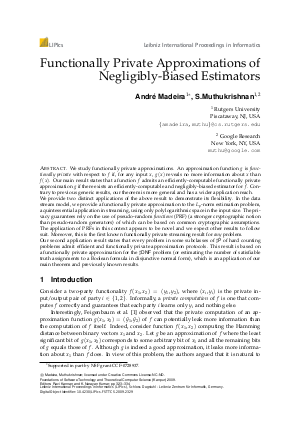Functionally Private Approximations of Negligibly-Biased Estimators
Authors André Madeira, S. Muthukrishnan
-
Part of:
Volume:
IARCS Annual Conference on Foundations of Software Technology and Theoretical Computer Science (FSTTCS 2009)
Part of: Series: Leibniz International Proceedings in Informatics (LIPIcs)
Part of: Conference: IARCS Annual Conference on Foundations of Software Technology and Theoretical Computer Science (FSTTCS) - License:
 Creative Commons Attribution-NonCommercial-NoDerivs 3.0 Unported license
Creative Commons Attribution-NonCommercial-NoDerivs 3.0 Unported license
- Publication Date: 2009-12-14
File

PDF
LIPIcs.FSTTCS.2009.2329.pdf
- Filesize: 251 kB
- 12 pages
Document Identifiers
Subject Classification
Keywords
- Functional privacy
- privacy
- data streams
- #P-complete
Metrics
- Access Statistics
-
Total Accesses (updated on a weekly basis)
0Document
0Metadata
Abstract
We study functionally private approximations.
An approximation function $g$ is {\em functionally private} with respect to
$f$ if, for any input $x$, $g(x)$ reveals no more information about $x$ than
$f(x)$.
Our main result states that a function $f$ admits an efficiently-computable
functionally private approximation $g$ if there exists an efficiently-computable
and negligibly-biased estimator for $f$.
Contrary to previous generic results, our theorem is more general and
has a wider application reach.We provide two distinct applications of the above result to demonstrate its flexibility.
In the data stream model, we provide a functionally private approximation to the
$L_p$-norm estimation problem, a quintessential application in streaming, using only
polylogarithmic space in the input size.
The privacy guarantees rely on the use of pseudo-random {\em
functions} (PRF) (a stronger cryptographic notion than pseudo-random
generators) of which can be based on common cryptographic assumptions.The application of PRFs in this context appears to be novel and we expect other results to follow suit.Moreover, this is the first known functionally private streaming result for {\em any} problem.
Our second application result states that every problem in some subclasses of \SP of
hard counting problems admit efficient and functionally private approximation protocols.
This result is based on a functionally private approximation for the \SDNF
problem (or estimating the number of satisfiable truth assignments to a
Boolean formula in disjunctive normal form), which is an application of our
main theorem and previously known results.
Cite As Get BibTex
André Madeira and S. Muthukrishnan. Functionally Private Approximations of Negligibly-Biased Estimators. In IARCS Annual Conference on Foundations of Software Technology and Theoretical Computer Science. Leibniz International Proceedings in Informatics (LIPIcs), Volume 4, pp. 323-334, Schloss Dagstuhl – Leibniz-Zentrum für Informatik (2009)
https://doi.org/10.4230/LIPIcs.FSTTCS.2009.2329
BibTex
@InProceedings{madeira_et_al:LIPIcs.FSTTCS.2009.2329,
author = {Madeira, Andr\'{e} and Muthukrishnan, S.},
title = {{Functionally Private Approximations of Negligibly-Biased Estimators}},
booktitle = {IARCS Annual Conference on Foundations of Software Technology and Theoretical Computer Science},
pages = {323--334},
series = {Leibniz International Proceedings in Informatics (LIPIcs)},
ISBN = {978-3-939897-13-2},
ISSN = {1868-8969},
year = {2009},
volume = {4},
editor = {Kannan, Ravi and Narayan Kumar, K.},
publisher = {Schloss Dagstuhl -- Leibniz-Zentrum f{\"u}r Informatik},
address = {Dagstuhl, Germany},
URL = {https://drops.dagstuhl.de/entities/document/10.4230/LIPIcs.FSTTCS.2009.2329},
URN = {urn:nbn:de:0030-drops-23298},
doi = {10.4230/LIPIcs.FSTTCS.2009.2329},
annote = {Keywords: Functional privacy, privacy, data streams, #P-complete}
}
